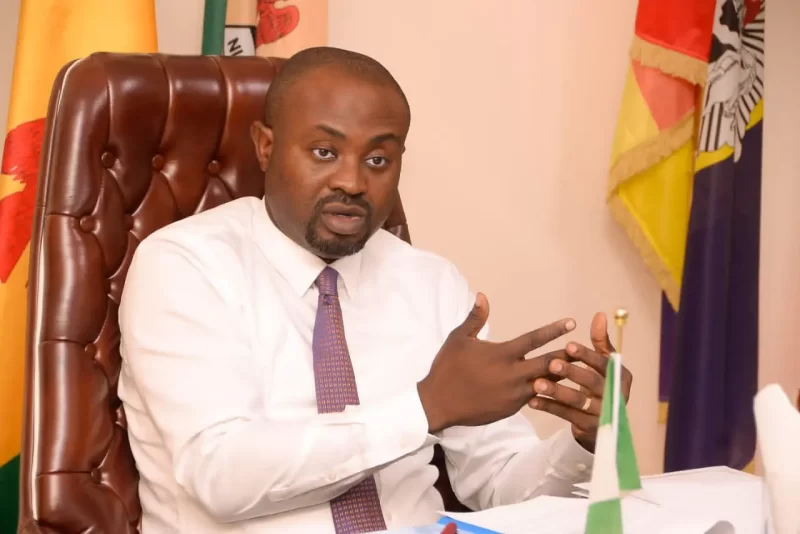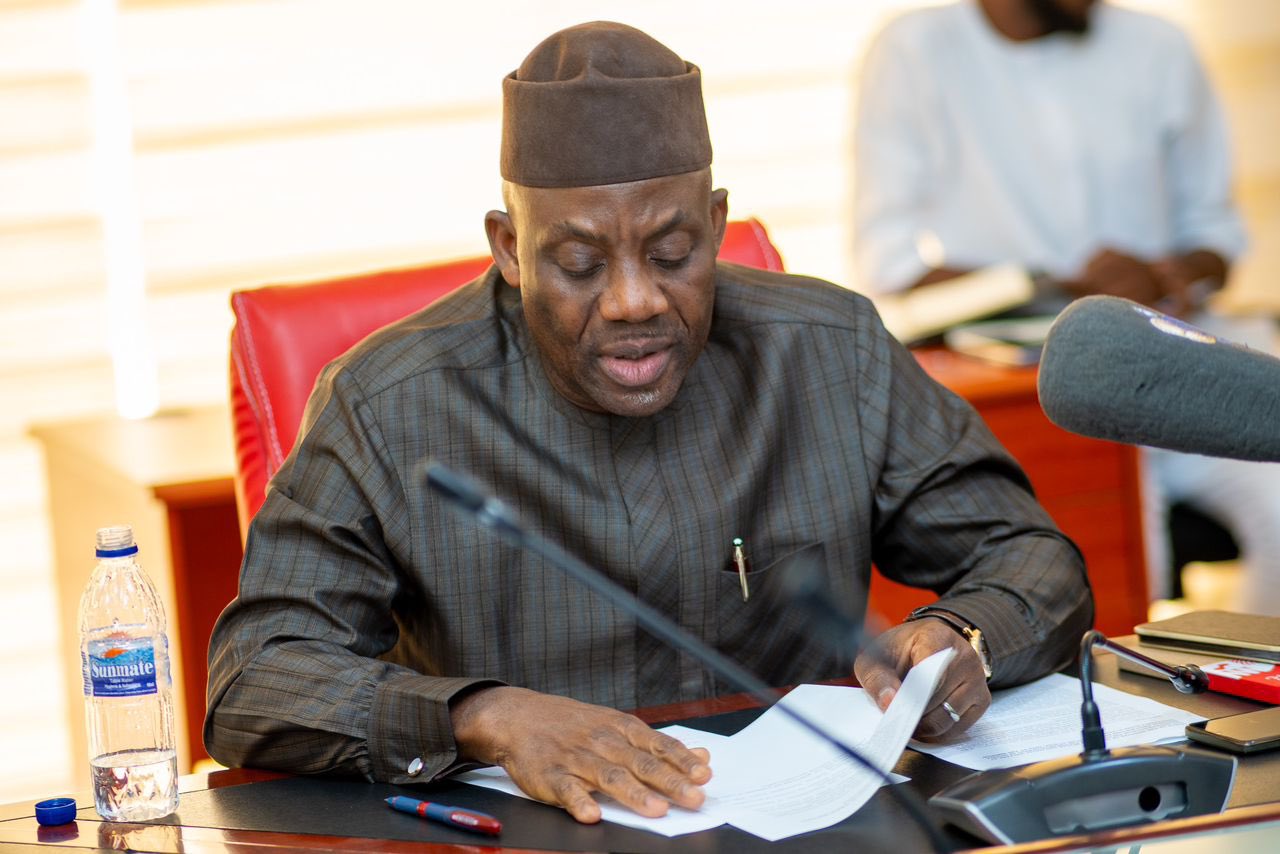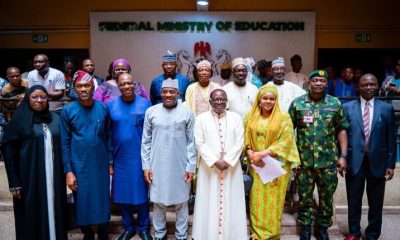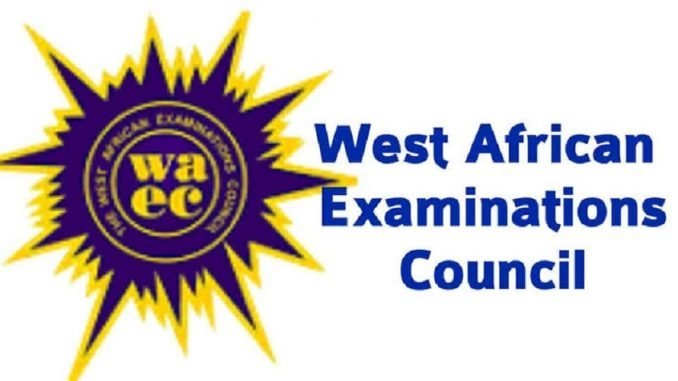Education
Internationalizing Higher Education is key – Tunji -Ojo

Eko Hot Blog reports that Minister of Interior, Olubunmi Tunji-Ojo has put the total of Nigerian Students who have left the country at no fewer than 99,985 to study in the universities in the United Kingdom between 2017 and 2022 while making the call to internationalize education in Nigeria.
Editors Pick
-
NECO Announces Release Of 2023 SSCE Result
-
FG Announces Plan To Commence Home Delivery Of Nigerian Passports
-
BREAKING: Police Officer Drambi Vandi Sentenced To Death By Hanging Over Killing Of Bolanle Raheem
He stated this yesterday at the opening ceremony of the 2023 University of Lagos International Week themed ‘Breaking the Borders of Partnership’.
In his address he posited that while it may look like there are ulterior motives for leaving the country, there is some respite knowing that the migrants are in pursuit of self-development which will have an impact on sustaining the future of Nigeria.
In view of this, he explained that it has become necessary to implement the passport application automation process to ensure a better experience for all .
“Every year, over 100 Nigerian students benefit from the scholarship for postgraduate and PhD degrees. I speak with students personally; we have hundreds of professionals and entrepreneurs leaving our shores to break new grounds in foreign lands.
“For us, we must ensure that we play our part in the actualisation of their dreams. They carry our identity, one which not only aids their pursuit, but also defines them.

”According to the Higher Education Statistics Agency (HESA) report, about 99,985 Nigerian students left this country to enroll in universities in the United Kingdom between 2017 and 2022.
“While many may contend that the majority of these students have simply ‘JAPA’ for other reasons, we cannot also deny the fact that a larger chunk of them have left with the purest of intent to seek further knowledge for self-advancement.
“Now, in going all through this, therefore, I may want to ask: why should our students now suffer to acquire international passports, even when they have paid for it?
“Their pursuit of breaking new grounds across borders, is one which gives us great joy as through our children, we sustain the future,” he said.
The minister said the ministry had commenced the automation of the end-to-end passport application process, and had given a timeline within which Nigerians would begin to have a sweet experience.
“By implication, Nigerians will not need to wait longer than two weeks before they get their passport.
“By January next year, Nigerians will be able to complete this application process online, and by February next year, with collaboration and partnership with other relevant stakeholders, Nigerians will have their passport delivered to their homes, offices and other locations of their choice,” he stated.
According to him, this will also be extended to the visa application process, with technology deployed throughout the entire process, to make it as seamless as possible.
The minister stated that to achieve this, his office had set everything in motion to open 12 more visa application centres across the world.
“In this regard, we are also working on strengthening our visa-on-arrival policy. We are working with the Ministry of Foreign Affairs to enforce the principle of reciprocity, and a committee has been set up in the ministry to achieve this.”
Tunji-Ojo also noted that the theme of the event reminded citizens that the challenges we face as a people were not confined by geographical boundaries.
He said whether it was addressing climate change, promoting global health, ensuring peace and security, or fostering economic prosperity, the world was more interconnected than ever before.
According to him, there is the need to embrace partnerships that transcend borders, to tackle these complex issues effectively.
“In breaking the boundaries of partnership, we are not using rhetorics. We lead from the front. This was strongly expressed by President Bola Tinubu recently while addressing the United Nations General Assembly (UNGA 78),” he said. The minister expressed his unwavering faith in the transformative power of education and research, noting that together, citizens could break the borders that hindered collaboration and unlock a brighter future for Nigeria, and by extension, Africa.
“Let our academic community be at the forefront of this noble endeavour, inspiring the next generation to build a Nigeria that thrives on unity, innovation, and shared prosperity.
He charged the academic community with the role to continue invaluable work to embed the essence of collaborative efforts over competition.
In his address, keynote speaker at the event, Vice Chancellor, University of Dundee, U.K, Prof. Iain Gillespie, said institutions, industries and policy makers across the globe must work together to address common challenges.
According to him, partnership has the ability to bring about expertise and capacity. “It requires genuine alignment of good and equitable relationships to deliver meaningful impact. Universities on their part, are indeed, meant to be centers for commitment to excellence in knowledge, character, and service to humanity. They must strive to transform lives locally and globally through triple intensity, to deliver on social purpose,” he said.
The Vice Chancellor of UNILAG, Prof. Folasade Ogunsola, who also graced the occasion noted that at the turn of the 21st century, the world had started to come to terms with the impact of globalization. She said this was so in all its ramifications on how life would be lived in the present and in the future.
Further Reading
-
Obasa Reads Riot Act To Lagos Council Chairmen, Mandates Submission Of Quarterly Projects
-
Lagos Govt Reopens Ladipo, Oyingbo, Other Closed Markets
-
FG Restructures N-Power, Extends Enrolment Age To 40 Years
According to her, the global-higher education sector was not left out as it was itself both a driver of, and a respondent to the changes being witnessed.
She noted that there was growing recognition among its managers on the place of universities and like institutions, as research, teaching and learning arena. Ogunsola said managers believed that if such institutions were going to be valuable to the knowledge economy of the 21st century, they would have to adapt to the imperatives of internationalizing higher education which ‘’remains a veritable route to foster the improvement of the quality of education and research, as well as expose our staff and students to global best practices, and assist them to make meaningful contributions to society in an increasingly globalized world”.
Click To Watch Our Video Of The Week
Advertise or Publish a Story on EkoHot Blog:
Kindly contact us at ekohotblog@gmail.com. Breaking stories should be sent to the above email and substantiated with pictorial evidence.
Citizen journalists will receive a token as data incentive.
Call or Whatsapp: 0803 561 7233, 0703 414 5611

















